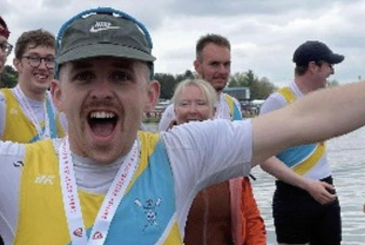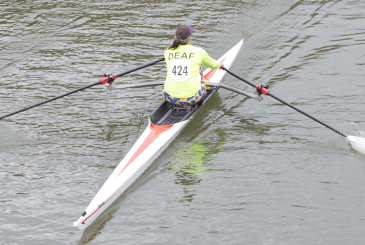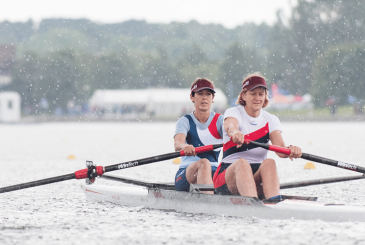As a rower, cox, coach or umpire, you spend a great deal of time outside during the summer months. This increases your risk of excessive sun exposure, which can cause premature skin ageing, sun damage, and skin cancer. Rowers are particularly at risk compared with participants in many other outdoor sports because they face a triple whammy from the sun above, its reflection off the water, and the actual water itself, which can wash away sunscreen.
Although the typical British summer weather can be unpredictable, skin cancer is the most common cancer in the UK, and there has been a particularly sharp rise in the number of cases since the 1970s.
Michelle Baker, CEO of the Melanoma Fund and creator of Sunguarding Sport says, “It only takes one blistering sunburn to more than double the chances of getting melanoma, which is a type of skin cancer that can spread to other areas of the body. With over 410 cases of skin cancer diagnosed each day, it’s a risk worth taking seriously. ‘Sunguarding’ is a good habit to get into.”
Remember that even when the sun doesn’t feel hot, or if it’s overcast, you can still be sunburnt. The key is checking the UV index, not the heat of the day. You can look this up on your phone and if it reads 3 or above then the UV rays can, at best, cause sun damage and, at worst, skin cancer.
The good news is that skin cancer is largely preventable as well as being treatable, particularly if detected early. In addition, long-term exposure to the sun without wearing good quality sunglasses can increase the risk of developing cataracts.
How to protect yourself from the sun
If possible, avoid being outside between 11am and 3pm, or when the UV index is very high.
If you can’t avoid being outside in the middle of the day, adopt the well-known Australian approach of ‘slip, slap, slop’.
Slip on a shirt and slap on hat
The most important thing to do is wear protective clothing including hats and 100% UVA and UVB protection sunglasses with a polarised finish.
Racer back tops are great for allowing free movement; they are not so great for protecting your shoulders and back from the sun. Rash tops are a great alternative, as are pull-on sports sleeves to protect arms and legs. However, if you prefer the former, ask someone else in your crew to help apply sunscreen to the tricky-to-reach parts.
Baseball caps protect the top of your head and shade your face, but for those with short hair, they don’t cover the back of your head. Bucket hats and cricket hats are good for this. Visors are fashionable, but they don’t protect the top of your head; any scalp that’s visible, for instance in your parting, will be in direct line for the suns’ rays.
Slop on the sunscreen
Supplement this by applying sunscreen. Choose a sunscreen with a Sun Protection Factor (SPF) of 30 or above and a minimum 4-star ultraviolet A radiation (UVA) protection.
You must reapply sunscreen every two hours or more frequently to ensure you stay protected, especially if you’re sweating or splashed with water. Be aware that if you use ‘all-day’ or ‘extended-wear’ sunscreen, you should still reapply it regularly as you might have missed a patch of skin first time round, and you could have rubbed it off from a particular area.
Greasy grip alert: if you’ve ever rubbed in sunscreen and then got straight in a boat, you’ll know how hard to row when your palms are still slimy. One way to avoid this and keep the sunscreen on the backs of your hands (washing them will take it off, of course) is to wipe your hands with a small towel and antibacterial gel. It works a treat!
How to check for signs of skin cancer
Although prevention is better than a cure, it’s important to regularly check your skin for signs of skin cancer. Early detection can help to reduce the risk of developing a larger, more serious skin cancer that may need extensive surgery or treatment.
You should be looking for:
- New skin lumps, spots, ulcers, scaly patches or moles that weren’t there before
- Marks (including moles) on the skin that have changed shape, colour, texture or size
- Sores that do not heal
- Any areas on the skin that are itchy, painful or bleed.
If in doubt, get it checked out by your GP.
This article was written in collaboration with the British Association of Dermatologists, who run Sun Awareness Week every year. For more information please visit www.skinhealthinfo.org.uk.
See also: Beat the heat for advice on other aspects of rowing in hot weather.
Photo: Jessica Tolkein.










